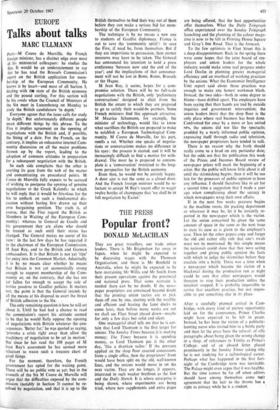Talks about talks
EUROPE MARC ULLMANN
Paris—M Couve de Murville, the French foreign minister, has a distinct edge over most of his ministerial colleagues: he studies the files. It would be an understatement to say that he has read the Brussels Commission's report on the British application for mem- bership of the European Community. He knows it by heart—and most of all Section 3, dealing with the state of the British economy and the pound sterling. For this section will be his credo when the Council of Ministers of the Six meet in Luxembourg on Monday to study the British candidature 'in depth.'
Everyone agrees that the issue calls for study 'in depth.' But unfortunately different people mean different things by this phrase. To the Five it implies agreement on the opening of negotiations with the British and, if possible, the fixing of a date. For the French, on the contrary, it implies an exhaustive internal Com- munity discussion on all the major problems thrown up by the report, leading to the adoption of common attitudes in preparation for a subsequent negotiation with the British.
So each side complains that the other is averting its gaze from the nub of the matter• and concentrating on procedural points. M Couve de Murville fully expects to be accused of wishing to postpone the opening of genuine negotiations to the Greek Kalends: to which he will reply that it would be frivolous for the Six to embark on such a fundamental dis- cussion without having first drawn up their own bargaining position. The truth is, of course, that the Five regard the British as Members in Waiting of the European Com- munity: whereas to General de Gaulle and his government they are aliens who should be treated as such until their status has changed. The General makes no secret of his view: in the last few days he has repeated it to the chairman of the European Commission, M Jean Rey, and to the British and German ambassadors. It is that Britain is not yet 'ripe' for entry into the Common Market. Admittedly it is by no means clear whether he means that Britain is not yet economically strong enough to support membership of the Com- munity or, on the contrary, that she has not yet fallen far enough to accept the role of tertius gaudens to Gaullist policies. It matters not; the point is that the General intends by all the means at his disposal to avert the threat of British adhesion to the Six. - The only remaining question is how he will set about it. Until he had had a chance to read the commission's report his attitude seemed to be that he would flatly oppose the opening of negotiations with Britain whatever the con- sequences. 'Better far,' he was quoted as saying, 'provoke a crisis right away than allow the machinery of negotiation to be set in motion.' But since he has read the 108 pages of M Jean Rey's assessment he has seemed more reluctant to waste such a treasure chest of good things.
For the moment, therefore, the French government has opted for the waiting game. There will be no public veto as yet; but in the councils of the Six M Couve de Murville will argue that the difficulties exposed by the corn-' mission (notably in Section 3) cannot be re- solved by negotiation, and that it is up to the British themselves to find their way out of them before they can make a serious bid for mem- bership of the European Community.
The technique is by no means a new one to students of Gaullist diplomacy. France is out to save the 'community spirit': to save the Five, if need be, from themselves. But if they are impervious to persuasion, then sterner measures may have to be taken. The General has announced his intention to hold a press conference 'between now and the end of the year'; and the implications of that announce- ment will not be lost in Bonn, Rome, Brussels or the Hague.
M Jean Rey, it seems, hopes for a com- promise solution. There will be no full-scale negotiations with the British, only 'preliminary conversations' designed to elicit from the British the extent to which they are prepared to go to satisfy their would-be partners. Some French ministers find this approach attractive. M Maurice Schumann, for example, the minister of technology, would like to know what sacrifices the British are prepared to make to establish a European Technological Com- munity. M Couve de Murville, for his part, smells a rat. Whether one speaks of negotia- tions or conversations makes no difference in his eyes: the process is started, and it will be increasingly difficult to find a motive for with- drawal. The most he is prepared to contem- plate is a 'conversation' restricted to the long- term perspective for the British economy.
Even then, he would not be entirely happy. A door ajar is not the same as a closed door. And the French foreign minister would be re- luctant to accept M Rey's recent offer to wager twelve bottles of champagne that 'we shall be in full negotiation by Easter.'


































 Previous page
Previous page